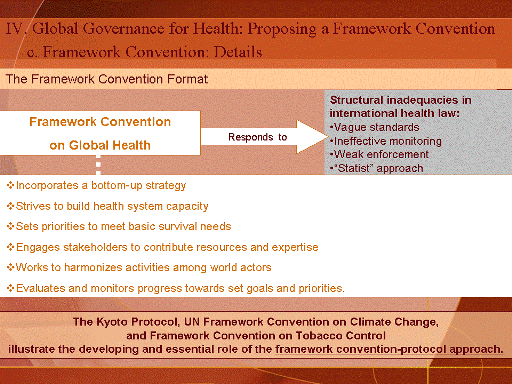Search for most updated materials ↑
| front |1 |2 |3 |4 |5 |6 |7 |8 |9 |10 |11 |12 |13 |14 |15 |16 |17 |18 |19 |20 |21 |22 |23 |24 |25 |26 |27 |28 |review |
 |
C. Toward a Framework
Convention on Global Health
The problem of global
health governance has perplexed scholars, and for good reason.
International health law has a number of structural
inadequacies—e.g., vague standards, ineffective monitoring, weak
enforcement; and a “statist” approach that insufficiently harnesses
the creativity and resources of non-State actors and civil society
more generally. The question of whether international law can, or
should, govern the diverse entities that influence global health is
the subject of intense debate in the literature. Indeed, modern
cutting edge global health governance initiatives eschew formal
international legal regimes, such as the Global Fund, Global Health
Security Initiative, and the International Finance Facility.
If law is to play a
constructive role, new models will be required and here I make the
case for a Framework Convention on Global Health. I am proposing a
global health governance scheme incorporating a bottom-up strategy
that strives to: build health
system capacity; set priorities to meet basic survival needs; engage
stakeholders to bring to bear their resources and expertise;
harmonize the activities among the proliferating number of actors
operating around the world; and evaluate and monitor progress so
that goals are met and promises kept.
The framework
convention-protocol approach is becoming an essential strategy of
powerful transnational social movements to safeguard health and the
environment. Two prime illustrations are the Kyoto Protocol to the
U.N. Framework Convention on Climate Change and the Framework
Convention on Tobacco Control. These framework conventions recognize
that a collective effort is necessary to mitigate the threat that
humans pose to health and the environment. Although far from
perfect, environmental and health conventions offer inventive
approaches to global governance, including “common but
differentiated responsibilities” for developing and developed
countries, multilateral funding mechanisms, and incentives to
facilitate compliance.
|